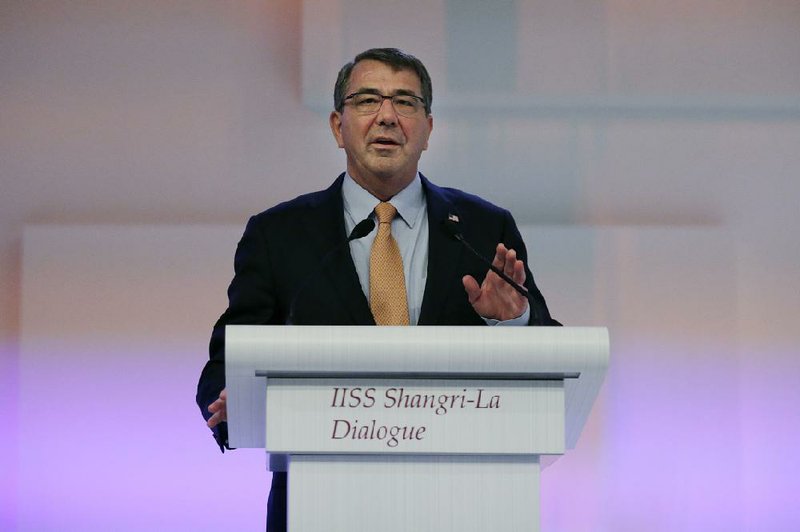SINGAPORE -- China vigorously defended its South China Sea land reclamation projects in the face of persistent criticism from U.S. leaders at an international security summit Saturday as the standoff in the Asia-Pacific region showed few signs of abating.
U.S. Defense Secretary Ashton Carter and other officials condemned the artificial island-building, but provided no details on what steps the U.S. may take to press China into diplomatic talks.
Carter said China's land reclamation was out of step with international rules, and that turning underwater land into airfields would not expand its sovereignty.
He and others said the U.S. opposes "any further militarization" of the disputed lands. That was a reference to two large motorized artillery vehicles that officials said China had placed on one of the artificial islands.
Chinese officials, in public statements and a private meeting, defended the construction and slammed the U.S. for interfering.
Chinese Foreign Ministry spokesman Hua Chunying said the U.S. was "making absurd remarks about China's long-established sovereignty and rights, stirring up trouble and slinging accusations regarding China's appropriate and rational construction activities on its islands. China resolutely opposes this."
At the conference, U.S. senators and officials from other Pacific nations questioned whether the U.S. would take action.
U.S. Sen. John McCain, chairman of the Senate Armed Services Committee, said the U.S. should not invite China to a major military exercise in the Pacific in 2016.
But Adm. Harry Harris, who just took over U.S. Pacific Command, said China has already been invited, and that the two countries must engage if they are to build a better relationship and lessen the chances for misunderstandings.
But, he said, "we always have the option of changing our approach."
He also said he was concerned by the artillery weapons, which were discovered at least several weeks ago. Two U.S. officials who are familiar with intelligence about the vehicles say they have been removed. The officials weren't authorized to discuss the intelligence and spoke only on condition of anonymity.
The Pentagon would not release any photos to support its contention that the vehicles were there.
China's behavior in the South China Sea has become an increasingly sore point in relations with the United States, even as President Barack Obama and China's President Xi Jinping have tried to deepen cooperation in other areas.
"Turning an underwater rock into an airfield simply does not afford the rights of sovereignty or permit restrictions on international air or maritime transit," Carter told the audience at the International Institute for Strategic Studies meeting.
China's actions have been "reasonable and justified," said Senior Col. Zhao Xiaozhuo, deputy director of the Center on China-America Defense Relations at the People's Liberation Army's Academy of Military Science.
China and some Asian nations have used dredging to expand reefs and shoals in the South China Sea, an area that carries some of the world's busiest shipping lanes. In the Spratly Islands, a collection of several hundred reefs, atolls and islands, Vietnam has 48 outposts; the Philippines, eight; Malaysia, five; and Taiwan, one. His criticism made it clear that other nations who are doing smaller land reclamation projects also must stop.
But China has created 2,000 acres of new land over the past 18 months, according to Pentagon estimates.
At the security meeting, McCain said he wants to see a gradual removal of the U.S. ban on providing lethal arms to Vietnam. He said the U.S. should provide additional defensive weapons that could be used in case of a conflict with China. The U.S. currently only allows the sale of lethal maritime security capabilities and for surveillance on a case-by-case basis.
One senior U.S. defense official said the U.S. was considering more military flights and patrols closer to the projects in the South China Sea, to emphasize reclaimed lands are not China's territorial waters. That official was not authorized to discuss the options publicly.
Meanwhile, police in Singapore stepped up security around the venue of the conference today after officers fatally shot one man and detained two others at a nearby roadblock.
The security conference was uninterrupted but access to the venue was restricted.
Police said in a statement today that officers opened fire after a vehicle with three people aboard crashed through police barricades. Substances believed to be drugs were found on one of the two people detained. The third man was shot dead, police said.
Information for this article was contributed by Liu Zheng and staff members of The Associated Press and by David J. Lynch and staff members of Bloomberg News.
A Section on 05/31/2015

